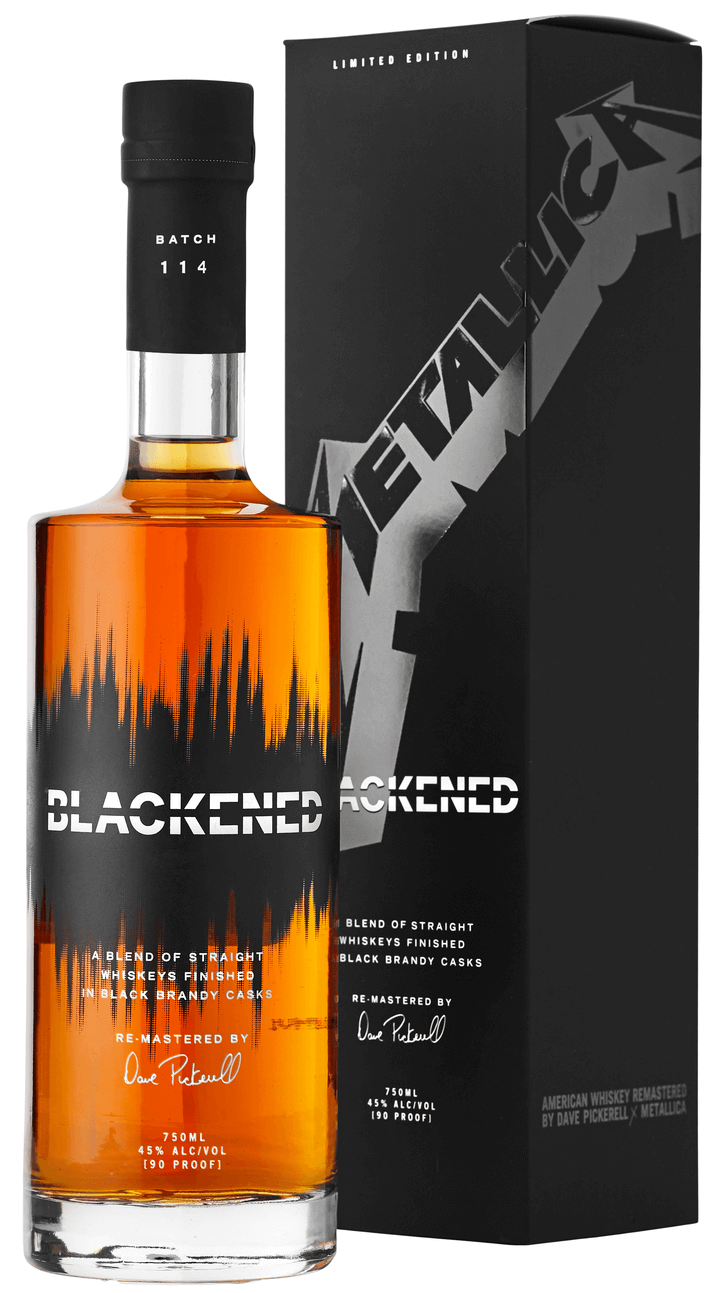Music Moves You: Can it Also Make Your Spirits Taste Better?
When I’d first heard the marketing story behind Blackened Whiskey, Metallica’s whiskey company, I was slightly dubious. Essentially, the Blackened team blasts their barrels with the band’s heavy metal music, disturbing the liquid so that it can take on more of the flavors from the porous oak. The product is great, though it’s impossible for a regular person to know if the great taste and flavors comes from great whiskey making alone or the sonic enhancement.
While the end result might sound like it’s more snake oil than whiskey, Blackened’s initial theory was based on science and the late Dave Pickerell’s long-held belief that vibrations could affect the contents of a barrel which dates back to an experience he had at West Point. When the famed distiller was a cadet he had noticed that the organist in the chapel would hold particular chords for a only a limited amount of time, and never longer. When Pickerell had asked the organist why he cut off certain chords, even though to Pickerell it sounded like those chords should have been held for longer, the musician explained that certain frequencies could actually shake the building if played for too long. It was physics and Pickerell found it fascinating. Could spirits be sonically enhanced?
Experimenting with Physics
Years later, in his whiskey-making, Pickerell was always playing with physics. To potentially change the flavor characteristics of his whiskeys at Whistle Pig, he drove his barrels around the country to see if the liquid sloshing inside would be altered by the constant movement. And since he understood how a Metallica concert could make a human container vibrate all of its blood and organs, when the band approached Pickerell about working together on a whiskey, he immediately wondered if the music could move the whiskey deeper into the wood, which would potentially change its flavor.
How Blackened Was Produced
The band with master distiller photo credit Danny Clinch
To produce Blackened, the team had Meyer Sound—the company that designs the proprietary sound system for all of Metallica’s concerts—create a new system that plays low frequency sonic enhancement to the aging whiskey, which did, in fact, move the spirit more deeply and more frequently in and out of the wood.
The specific Metallica song that’s played to a particular batch hits it at a low frequency, says Rob Dietrich, Blackened’s new master blender. Because they are only using the muffled low-end bass, “we had to create a soundproof room [for the whiskey] because I didn’t want to drive these guys crazy,” Dietrich says of his workers. “It’s like a car vibrating.”
Dietrich often hears the same comment from his team: “I love Metallica, but it drives me nuts not being able to add the treble.”
Despite a small sample size, Blackened did have the data to show that their sonically-enhanced brandy barrels’ soak lines—the points in the wood to where the whiskey soaks through to—had moved more toward the exterior of the barrel, as compared to other barrels not blasted with music day in and day out.
Dietrich didn’t just rely on the soak line. He also worked with an independent lab to analyze the nine flavor profiles typically found in whiskey. As compared to the control group, all nine flavors were enhanced. The chemical compounds of whiskey were analyzed in the Blackened whiskey, as compared to a control, and all the compounds—the lactones, aldehydes, esters, etc—were found to be elevated.
The Future for Musically Enhancing Spirits
Other distilleries have adopted a similar approach. Copper & Kings American Brandy Co. in Kentucky uses five subwoofers in their maturation cellar to rattle their barrels, calling the musical enhancement “sonic aging.” Spirit Works Distillery in California, for the past eight years, has played music—from metal to bluegrass to straight Led Zeppelin—through large headphones wrapped around 53-gallon barrels 24/7. “Our theory was that if whiskey needs interaction with the wood to mature,” Spirit Works notes on their website, “maybe we could amplify… that process with music vibrations.”
Tuthilltown Spirits’ Hudson Whiskey in New York used to do something called “sonic maturation,” too. Quite similar to what Copper & Kings is doing today, I called up to talk with the minds behind this sonically-matured liquid. But the receptionist told me it was discontinued. “It wasn’t very successful,” she said. Perhaps in the end, music is best used to enhance your life rather than to enhance the spirit in your glass.



